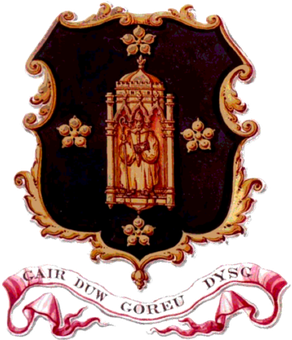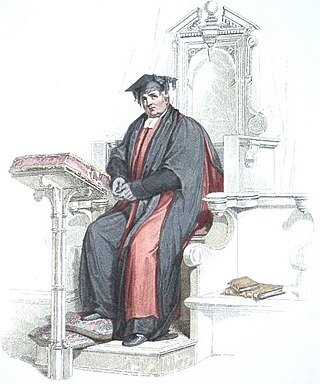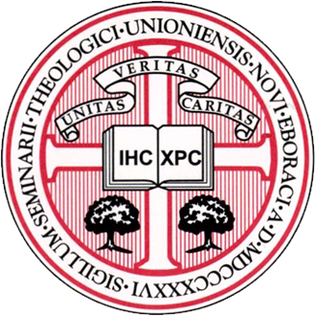Theology is the study of religious belief from a religious perspective, with a focus on the nature of divinity. It is taught as an academic discipline, typically in universities and seminaries. It occupies itself with the unique content of analyzing the supernatural, but also deals with religious epistemology, asks and seeks to answer the question of revelation. Revelation pertains to the acceptance of God, gods, or deities, as not only transcendent or above the natural world, but also willing and able to interact with the natural world and to reveal themselves to humankind.

University of Wales, Lampeter was a university in Lampeter, Wales. Founded in 1822, and incorporated by royal charter in 1828, it was the oldest degree awarding institution in Wales, with limited degree awarding powers since 1852. It was a self-governing college of the University of Wales from 1972 until its merger with Trinity University College in 2010 to form the University of Wales Trinity Saint David.

Heythrop College, University of London, was a constituent college of the University of London between 1971 and 2018, last located in Kensington Square, London. It comprised the university's specialist faculties of philosophy and theology with social sciences, offering undergraduate and postgraduate degree courses and five specialist institutes and centres to promote research.

Ridley Hall is a theological college located on the corner of Sidgwick Avenue and Ridley Hall Road in Cambridge, which trains men and women intending to take Holy Orders as deacon or priest of the Church of England, and members of the laity working with children and young people as lay pioneers and within a pastoral capacity such as lay chaplaincy.

A Doctor of Divinity is the holder of an advanced academic degree in divinity.

Union Theological Seminary in the City of New York is a private ecumenical liberal Christian seminary in Morningside Heights, Manhattan, affiliated with Columbia University. Columbia University lists UTS among its affiliate schools, alongside Barnard College and Teachers College. Since 1928, the seminary has served as Columbia's constituent faculty of theology. In 1964, UTS also established an affiliation with the neighboring Jewish Theological Seminary of America. Despite its affiliation with Columbia University, UTS is an independent institution with its own administration and Board of Trustees. UTS confers the following degrees: Master of Divinity (MDiv), Master of Divinity & Social Work dual degree (MDSW), Master of Arts in religion (MAR), Master of Arts in Social Justice (MASJ), Master of Sacred Theology (STM), Doctor of Ministry (DMin), and Doctor of Philosophy (PhD).
The Episcopal Divinity School (EDS) is an unaccredited theological school in New York City. Established to train people for ordination in the American Episcopal Church, the seminary eventually began training students from other denominations. The school currently does not enroll any seminarians, and states that it is currently "exploring multiple models for theological education."

Harvard Divinity School (HDS) is one of the constituent schools of Harvard University in Cambridge, Massachusetts. The school's mission is to educate its students either in the academic study of religion or for leadership roles in religion, government, and service. It also caters to students from other Harvard schools that are interested in the former field. HDS is among a small group of university-based, non-denominational divinity schools in the United States.

Westminster College in Cambridge, England is a theological college of the United Reformed Church. Its principal purpose is training for the ordination of ministers, but is also used more widely for training within the denomination.
Krister Olofson Stendahl was a Swedish theologian, New Testament scholar, and Church of Sweden Bishop of Stockholm. He also served as dean, professor, and professor emeritus at Harvard Divinity School.

Alister Edgar McGrath is a Northern Irish theologian, Anglican priest, intellectual historian, scientist, Christian apologist, and public intellectual. He currently holds the Andreas Idreos Professorship in Science and Religion in the Faculty of Theology and Religion, and is a fellow of Harris Manchester College at the University of Oxford, and is Professor of Divinity at Gresham College. He was previously Professor of Theology, Ministry, and Education at King's College London and Head of the Centre for Theology, Religion and Culture, Professor of Historical Theology at the University of Oxford, and was principal of Wycliffe Hall, Oxford, until 2005.

New College is a historic building at the University of Edinburgh which houses the university's School of Divinity. It is one of the largest and most renowned centres for studies in Theology and Religious Studies in the United Kingdom. Students in M.A., M.Th. and Ph.D. degree programmes come from over 30 countries, and are taught by almost 40 full-time members of the academic staff. New College is situated on The Mound in the north of Edinburgh's Old Town.

The Chicago Theological Seminary (CTS) is a Christian ecumenical American seminary located in Chicago, Illinois, and is one of several seminaries historically affiliated with the United Church of Christ. It is the oldest institution of higher education in Chicago, originally established in 1855 under the direction of the abolitionist Stephen Peet and the Congregational Church by charter of the Illinois legislature.

Candler School of Theology is one of seven graduate schools at Emory University, located in metropolitan Atlanta, Georgia. A university-based school of theology, Candler educates ministers, scholars of religion and other leaders. It is also one of 13 seminaries affiliated with the United Methodist Church.

Yale Divinity School (YDS) is one of the twelve graduate and professional schools of Yale University in New Haven, Connecticut.
The University of Chicago Divinity School is a private graduate institution at the University of Chicago dedicated to the training of academics and clergy across religious boundaries. Formed under Baptist auspices, the school today lacks any sectarian affiliations.
The Gloria L. and Charles I. Clough School of Theology and Ministry (CSTM) is a Jesuit school of graduate theology at Boston College. It is an ecclesiastical faculty of theology that trains men and women, both lay and religious, for scholarship and service, especially within the Catholic Church.
Andover Newton Theological School (ANTS) was a graduate school and seminary in Newton, Massachusetts, affiliated with the American Baptist Churches USA and the United Church of Christ. It was the product of a merger between Andover Theological Seminary and Newton Theological Institution. In recent years, it was an official open and affirming seminary, meaning that it was open to students of same-sex attraction or transgender orientation and generally advocated for tolerance of it in church and society.

The CambridgeFaculty of Divinity is the divinity school of the University of Cambridge. It houses the Faculty Library.

The Cambridge Centre for Christianity Worldwide (CCCW) is a study, teaching and research centre in Cambridge, England and a member of the Cambridge Theological Federation which is affiliated with the University of Cambridge.














